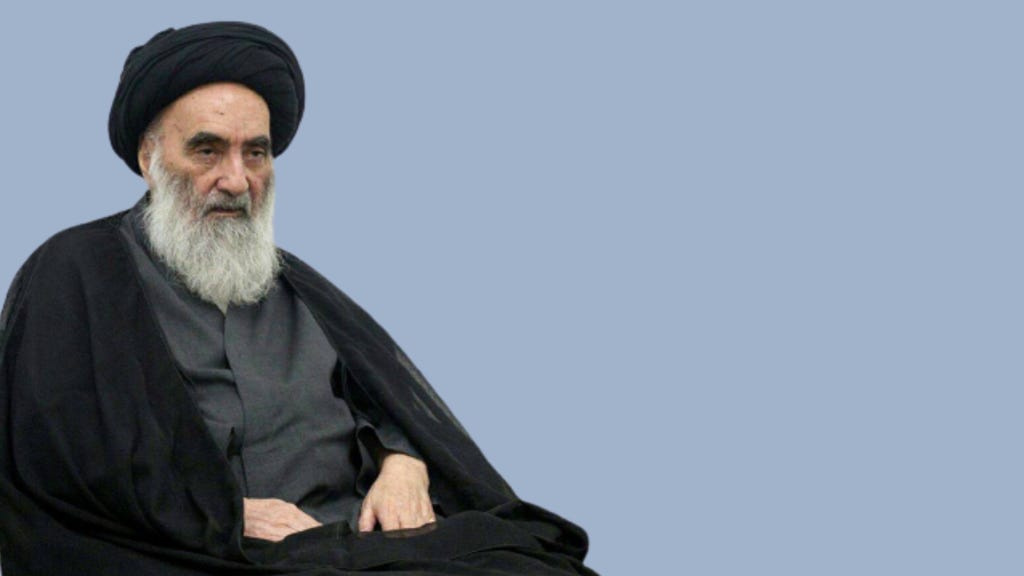Sistani warns of regional chaos amid Israel–Iran escalation
The office of Grand Ayatollah Ali Al-Sistani has issued two statements over the past week in response to the escalating conflict between Israel and Iran. Together, they reveal Najaf’s grave concern over the unfolding crisis and its potential to plunge the wider region into chaos.
The first statement from Sistani’s office was released on June 13, immediately after Israel launched its initial strikes on Iran, which targeted Iranian nuclear scientists and military commanders, and also resulted in the deaths of scores of civilians. The full statement reads:
“The criminal act committed at dawn on Friday by the occupying regime of Palestine—through the martyrdom of a number of Iranian scientists, military commanders, and civilian people, including women and children, and the attack on several institutions and scientific centers of the country—once again proved the dangerous and aggressive nature of this regime.
While asking for mercy and elevated ranks for the great martyrs, offering condolences to their honorable families, and wishing a swift recovery for the wounded and injured, we strongly condemn this criminal action and expect the international community to, by putting pressure on this aggressive regime and its supporters, prevent the continuation of such aggressions.
We ask Almighty God for the continued honor and dignity of the noble Iranian nation. There is no power and no strength except through God, the Most High, the Most Great.”
On June 19, as the likelihood of direct US involvement in strikes against Iran grew and rhetoric escalated with threats directed at Iran’s Supreme Leader Ali Khamenei, Sistani’s office issued a second, more forceful statement:
“The Supreme Religious Authority in Najaf renews its strong condemnation of the continued military aggression against the Islamic Republic of Iran and any threat to target its highest religious and political leadership. It warns that carrying out such a criminal act—not only representing a clear violation of religious and moral standards and a blatant breach of international norms and laws—also portends extremely dire consequences for the situation across the entire region. It could lead to a complete loss of control and widespread chaos, further exacerbating the suffering of its peoples and severely harming the interests of all parties involved.
Accordingly, we call upon all active international actors and countries around the world—particularly Islamic nations—to exert their utmost efforts to stop this unjust war and to find a fair and peaceful solution to the Iranian nuclear issue in accordance with the principles of international law.”
From the outset, Sistani places unequivocal blame on Israel, referring to the strikes as criminal acts and calling on the international community to intervene and halt further aggression.
Sistani’s two statements consistently frame the conflict as both unlawful under international norms and morally unacceptable by religious standards. He condemns Israel for initiating aggression and rejects threats against Iran’s highest leadership, implicitly warning against further escalation.
Neither statement proposes a direct Iraqi response. The absence of any reference to Iraq’s military or diplomatic role suggests that Najaf views the conflict as an international matter, one that requires pressure from influential global actors rather than Iraqi involvement. This omission indicates that Sistani sees the crisis as beyond Baghdad’s capacity to influence, and instead views Iraq as vulnerable to the consequences of regional escalation. His appeal to the international community, particularly Islamic nations, reflects Najaf’s belief that only external actors with real diplomatic or political weight can alter the course of events.
By grounding his message in both religious terms and international law, Sistani reinforces a longstanding Najafi principle that true stability and justice depend on adherence to recognized norms. His call for a fair and peaceful resolution to the Iranian nuclear issue underscores his conviction that negotiation, not confrontation, is the path to de-escalation.
Together, the two statements express Najaf’s firm rejection of violence as a tool for resolving geopolitical disputes. They reflect Sistani’s warning that unchecked military escalation endangers not only Iran but the entire region, and place responsibility squarely on global powers and international institutions to prevent further chaos.


